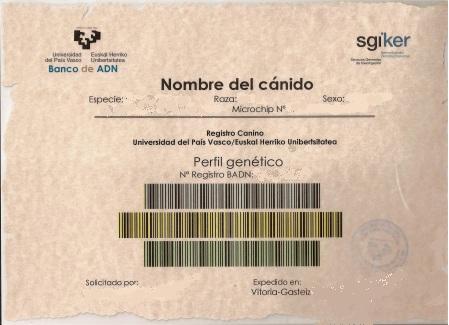DNA BANK
NON-HUMAN DNA
Is it possible to analyse the DNA of my pets?
DNA from pets can be analysed with the utmost guarantee, thanks to the development of the Genome project.
Among pets, the genetic fingerprinting of dogs and cats can be obtained.
It is also possible to analyse the fingerprints of other species (check at bancoadn@ehu.es).
Must my pet be a pedigree?
No, the genetic fingerprint comes from DNA and this is found in all living beings.
What benefits can it provide?
Animals do not have fingerprints. However, they have their own genetic fingerprint.
Once the DNA has been analysed, the genetic fingerprint obtained becomes encoded via a bar code that enables the animal to be identified safely.
This identification is of great value if the animal is lost as, unlike any other method, it is both permanent and indelible.
In the case of pedigrees, it enables their pedigree to be certified.
The encoded genetic fingerprint goes on to form part of the DNA Bank Register which certifies it via the issuing of the relevant supporting document .
From where is the DNA extracted?
Generally speaking, from saliva, although blood or other biological samples can also be used because DNA is the same in all the body's cells.
How is the sample taken?
Three sterile swabs are used per animal, they are soaked with saliva, and then sent to the laboratory.
Who do samples have to be taken from?
Genetic fingerprint: from the animal that you wish to include in the DNA Canine Register of Feline Register at the University of the Basque Country UPV/EHU.
Pedigrees: from the parents and litter that you wish to certify. If the parents have been previously analysed, only samples from the litter are taken .
How do I obtain the material to take the sample?
Write to bancoadn@ehu.es and once the test has been arranged, we will send you a sample-taking kit.
When and how can I send the samples?
The samples must be sent immediately after they have been taken. This can be done by regular post with acknowledgement of receipt or via messenger service.
How much does the test cost?
The genetic fingerprint of each individual pet costs 45 Euros (plus 16% VAT).
How is payment made?
Via payment into a bank account or credit card.
How long does it take to receive the result?
If you have an email address, you will receive the results within the following 15 days after the sample have arrived at the laboratory.
Is the result reliable?
10 microsatellite markers are analysed.
In the case of pedigree certification, positive and negative maternity and paternity probably ratios of over 99.99% are attained, which enables the fact that each puppy belongs to the same genetic line as the parents to be assured.
Is the laboratory qualified to carry out these tests?
The laboratory holds the certificate of having successfully undergone the annual exercises carried out by the GEP of the International Society of Forensic Genetics.
Does the laboratory have experience in these types of test?
The team at this laboratory has been carrying out paternity tests continuously since 1988.
Feline DNA register
The Feline DNA Register is currently being created. In the case of the Feline Register, the animal is certified that is free of any mutations in the PKD1 gene, in addition to the genetic fingerprint.
Canine DNA Register
The DNA Bank at the University of the Basque Country, UPV/EHU, has established a Canine DNA Register.
All the animals analysed are given a number and their genetic fingerprint is encoded in a bar code - the same one that is sent to the owners via a document like the one shown below.


